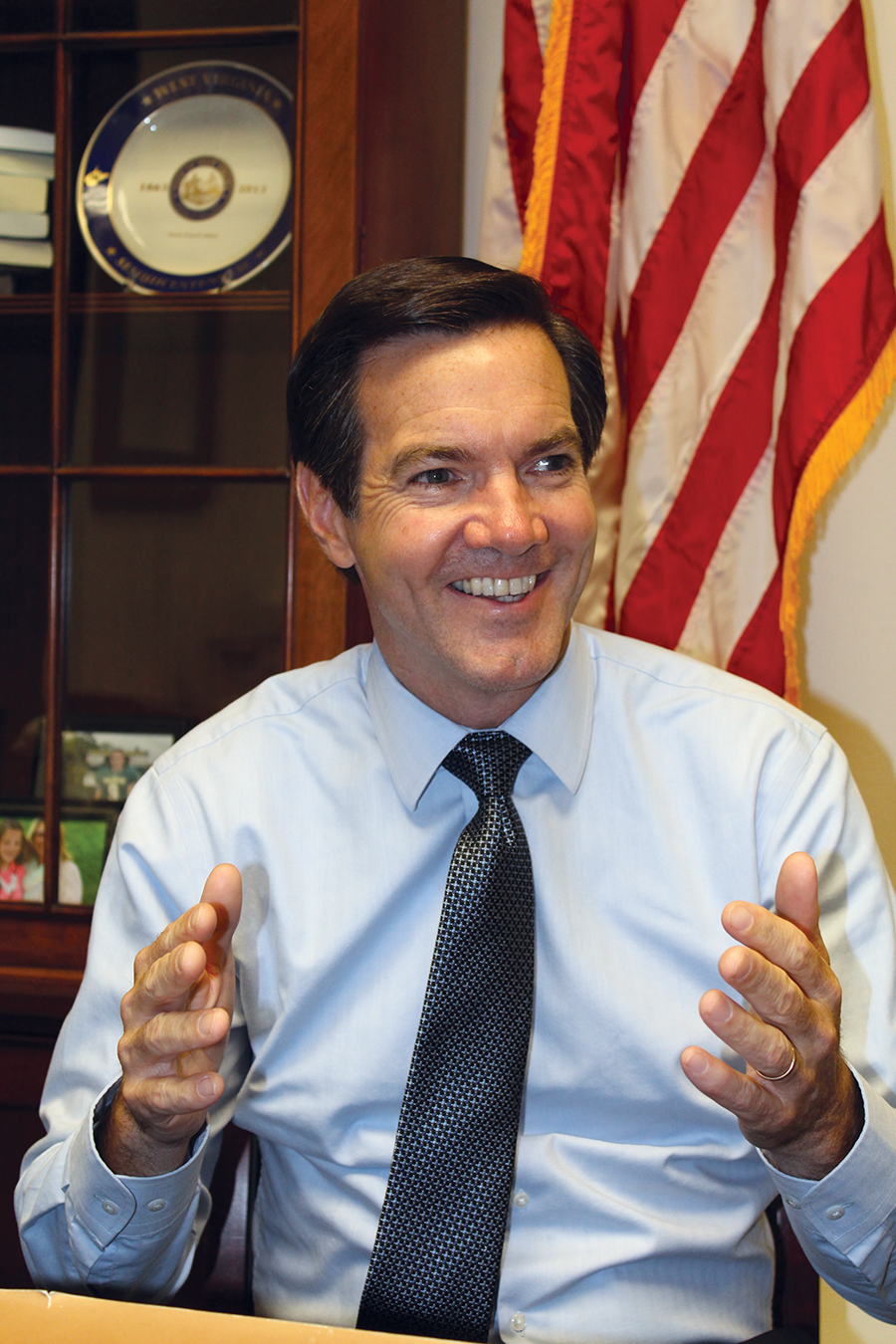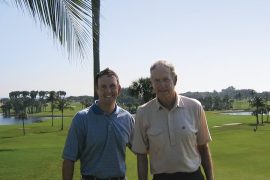A candid conversation with the freshman congressman about party affiliation, bipartisanship, drugs in Huntington, the war on coal and life on Capital Hill.
Interview by Marc Williams
HQ 90 | SUMMER 2015
West Virginia’s Third District congressman may be a newcomer to national politics, but Evan Jenkins has a long history of public service to his home state. Born September 12, 1960, in Huntington to Dorothy C. Jenkins and the late John E. Jenkins Jr., he earned a B.S. in business administration at the University of Florida in 1983, and his J.D. from Samford University’s Cumberland School of Law in 1987.
Much of his career has been in the economic development and health care arenas, serving as the general counsel of the West Virginia Chamber of Commerce and the executive director of the West Virginia State Medical Association.
Jenkins began his political career as a Democrat and was first elected to the West Virginia House of Delegates in 1994, where he served three terms. In 2002, he was elected to the state Senate, where he also served three terms.
In 2013, Jenkins announced he was switching parties to run as a Republican for the Third Congressional District of the U.S. House of Representatives against longtime incumbent Nick J. Rahall.
“I am leaving Barack Obama’s party to become a Republican and run for Congress against Nick Rahall,” Jenkins said at the time. “West Virginia is under attack from President Obama and a Democratic Party that our parents and grandparents would not recognize.”
In what many saw as an upset, he easily defeated Rahall and took office in Washington, D.C., in January.
Evan and his wife, Elizabeth, have three children. Evan has served on numerous non profit boards and community organizations in the Tri-State region and can often be found running in Ritter Park. He ran the Marshall Marathon, and for his 50th birthday he bungee jumped off the Kawarau Bridge in New Zealand, the birthplace of commercial bungee jumping.
HQ asked Marc Williams, a nationally renowned attorney based in Huntington, to sit down with Congressman Jenkins for an in-depth interview. No stranger to politics, Williams is a former Marshall University student body president. He met with Jenkins on a cool April morning to discuss, among other things, party affiliation, bipartisanship, the drug epidemic in Huntington, the EPA’s war on coal and life on Capitol Hill.
Tell me about your adjustment to life in Washington.
It’s been a whirlwind since election night. In fact, new member orientation started the next week. Having served in the state legislature for 18 years, the legislative process was something I was pretty comfortable with. But I still had to hire staff for the D.C. and district offices to be our “boots on the ground” servicing the constituents back here in the 18 counties of the Third Congressional District. I often get asked, “How’s Washington? Are you getting settled in?” Well, I’m not quite sure what the best answer is. I didn’t run for office to come to Washington and get settled in. Folks laugh when they learn I sleep in my office on a cot. I come home when the last votes are cast usually Thursday or Friday. I head back to Washington the first of the week when votes are scheduled. I’m in Washington three weeks each month, and then one week is dedicated back in the district doing constituent service work. Each day I’m back, I try to get around as much as possible to the counties in the Third District. You really get to know the people and issues. I can see the challenges we face but am truly excited about the possibilities of working to help turn our state and country around.
Why make the choice not to live in Washington, but to sleep in your office and keep your home in Huntington?
I was born and raised in Huntington. I love West Virginia. E.B. and I have three children. Our oldest just finished college, one is starting this fall and our daughter is in high school. This is home to us. This was never about uprooting our family and moving to Washington. While there are those who relocate their family to Washington, serving in Washington today I hear is different than it was 20, 30, 40 years ago. The expectations of the constituents, rightfully so, is that they want to see you in their communities. They want you engaged in their issues, and you have to do that face to face. You can’t go to Washington and get all consumed with the Washington environment. The action, from my perspective, is here in the district.
Is the schedule of being back in the district as often as you can a way to keep in contact with the voters?
You do have to keep your ear to the ground. Again, with 18 counties, it takes four-and-a-half hours to drive from one end of the district to the other. I use social media to keep in touch with constituents and share updates and pictures about what I’m doing. I’m on Facebook and Twitter at @RepEvanJenkins. You simply can’t serve the needs of the people of the district full time from Washington. Coming home is important.
In 2013 you decided to switch from the Democratic Party to the Republican Party. What led to this decision?
I could not sit idly by when I saw, at the federal level in particular, the hard push to the political left by this administration and folks like Nancy Pelosi and Harry Reid that were charting their party’s agenda – the war on coal, big government control of our health care system coming between the doctor-patient relationship, infringement on constitutional rights. This was a direction I could not be a part of, so I changed my party registration and ran for Congress to try to do something about it. I just felt like our country was being led by a president and a party moving us in the wrong direction. I couldn’t be a part of that, and I wanted to give West Virginians a new choice for a new direction.
You were appointed to the House Appropriations Committee. What is your role on that committee in terms of what you can do for your district?
There are, essentially, what they call four “A” committees in the House – Ways and Means, Financial Services, Energy and Commerce and Appropriations. Right after the election in November, the folks who were helpful to me said, “It’s time to start on the next campaign.” I said, “My goodness, 2016 is two years away.” They said, “No, we’re talking about your campaign for a good committee.” So, we worked really hard from the November election through early December when the House Steering Committee made the committee decisions. There were only going to be one or two freshmen members on two of the four “A” committees. Appropriations has a long history of making a real investment in West Virginia thanks to Sen. Byrd. Out of the 57 freshmen members, there were two able to get on Appropriations, and I was fortunate to be one of those two. I chalk it up to two reasons: First, the leadership of the House was very engaged in my race. They came into the state and helped every step of the way. That gave me an opportunity to get to know them and them to get to know me. So when I showed up after the election we already had a good relationship established. The second reason is Harold Rogers, who is chairman of Appropriations. He’s right across the border in Kentucky. His district is Appalachia. His district is also feeling the war on coal. We both have a passion for finding real solutions to the drug crisis. We have a lot in common. I said to Chairman Rogers, “Help me help you.” After getting appointed to the committee you then have to try to get on the key subcommittees that have the greatest impact on your district. My top choice was to be on the Interior Subcommittee that handles the EPA budget. It also handles the budget of the Department of the Interior and other federal agencies such as the National Park which is important to the district because of the New River Gorge and several other Park Service areas. I was also able to get on the Transportation Subcommittee that handles funding for highway road building authorization. We have real transportation needs in the district. Appropriations gives you a chance to meet most of the key agency heads who make the key decisions. I had the opportunity to sit with the head of the EPA, Gina McCarthy, and question her and challenge her on the war on coal. I’ve met with Secretary of the Interior Sally Jewell to talk about everything from surface mining to the Park Service. We’re using the power of the purse in a positive way like the funding I helped secure for Beech Fork, but we’re also using it to send a clear message that we do not want to allow our tax dollars to be spent on the regulatory overreach that’s so devastating to West Virginia.
What is a typical day for you when you’re in D.C.?
Your day really is jam-packed. You have constituents and organizations from the district that are in town to see you – whether it’s the Chamber of Commerce or the UMWA, we get lots of visitors. Folks want to meet with their congressman. We welcome any and all to come to Washington. The door is open. Regardless of political stripes or the issues, we are there to listen and help if at all possible. Then, there are committee meetings. On the Appropriations Committee for example, we have already completed six of the 12 bills that fund our $1.3 trillion discretionary federal budget. They say it’s the earliest we’ve gotten this many approps bills done in committee in recorded history. The House and Senate have passed a budget for the first time in a number of years – I really want to get us on the road to a balanced budget. Our debt and deficit is out of control. It’s simply unacceptable. So, you meet with constituents, you attend committee meetings and you have floor votes. Every day that I’m in Washington is a day where votes are scheduled. The day typically is broken up into 15-minute segments. My team puts the schedule together, and usually we’re holding two or three meetings in our office at any one time all day long. It’s a busy day, it’s an engaging day. The key is to have a great staff. We’ve got great people passionate about making a difference who work really hard.
A lot of people are concerned about the tone in Washington and the inability of Republicans and Democrats to work together. Have you seen any bipartisan developments?
The media today, partly because of the 24/7 constant air-war political chatter, suggest that there is a really bitter, contentious environment in Washington. From where I sit, while there are strong policy differences on a number of important issues, we still try to work together. Our Republican conference meets each Tuesday morning to talk about the issues of the week. These are usually pretty lofty discussions, and there’s no Democratic bashing going on during those discussions. So I’m not sensing the caustic environment that the public has been led to believe. In the U.S. House, in our first 100 days, we’ve passed more than 50 bills, many with bipartisan support. Getting things through the Senate are a little more challenging because of the 60-vote cloture rule.
It appears you have a good working relationship with Sen. Manchin and Mayor Steve Williams. Is it because the politics are more local and regional in nature with them and party labels don’t mean as much? What role do personal relationships play in trying to get things done.
Mayor Williams is a close personal friend. I know he’s working really hard to improve Huntington and tackle the challenges we face. We talk constantly and have an excellent working relationship. I’ve known Joe Manchin for many years as well. We served in the legislature together and I was serving at the statehouse when he was governor. He and I work well together. I served with Sen. Shelley Moore Capito in the state legislature in the late 1990s. We’ve been friends ever since. She’s doing a terrific job and, in fact, was able to get on the Appropriations Committee as a freshman U.S. senator. We work together on the funding priorities for our state. Securing funding in both the House and Senate bills is a big victory and helps get us across the finish line. You have to remember, we are a small state. Our congressional delegation – Alex Mooney, David McKinley and myself – usually sit together on the House floor during votes. There’s not assigned seating, but we try to sit together so we can talk and compare notes on the issues important to our state. I guess my last point is that while I’m a proud Republican member of Congress, I don’t wear party affiliations on the sleeve. Whether I’m working with Mayor Williams to tackle the drug crisis in our community or making critical investments in the Third Congressional District with Sen. Capito, these aren’t Republican and Democrat issues to me. These are real people’s issues and I’ll work with anyone to solve a problem.
You’ve been very active in addressing the drug issue from a treatment standpoint, especially dealing with drugs as they affect newborn babies. Huntington, like dozens of cities around the country, is facing this problem. What can Congress do to help address that issue?
In Huntington I had the honor of working with local nurses and community leaders to establish Lily’s Place to care for newborn infants who were exposed to drugs during pregnancy. I’m excited because in the next few months I will be introducing legislation in Congress that will enable other communities to mirror the work being done in Huntington. Lily’s Place came about through an incredible amount of effort from two passionate NICU nurses – Sara Murray and Rhonda Edmunds – along with incredible leadership from Mary Brown. Working with these three women, and countless other volunteers and community leaders, we had to break through a lot of traditional structures, rules and bureaucratic regulations. The idea of an inpatient pediatric recovery center for newborns is not something that is recognized under traditional licensing regulations. This year the West Virginia Legislature, through House Bill 2999, was able to create a licensure structure for facilities like Lily’s Place. That was a great step forward, and our local state legislators deserve a lot of credit for what they achieved. Lily’s Place, I am confident, will be a best-practice example that other communities will be able to embrace. This is the right care in an environment that is nurturing for these newborn infants struggling through the ravages of withdrawal. And, we’re doing it with significant cost savings.
A lot of the counties in your district are coal counties. The president has made it clear that coal is not something he perceives as being part of the energy mix for the future. What, if anything, can be done to help Southern West Virginia?
I firmly believe that coal has a future. The Obama administration and Democrats in Washington have put a bull’s-eye on coal and are attacking the use of coal at every turn. I think our Attorney General Patrick Morrisey has done an outstanding job fighting this administration’s regulatory overreach. He has been fighting them every step of the way. But, they are imposing standards on power plants that simply render any coal-fired power facilities economically unfeasible. The impact of this war on coal for the last six years is devastating. We’ve lost more than 40 percent of our coal jobs in Appalachia. The average coal wage is in the $60,000 – $75,000 a year range. I am working every day to fight for the future of coal. If we can get the world markets and domestic markets going again with a robust economy and stop the overregulation, then I think coal will play an important role and we can get our communities back on their feet. But we must also look at future economic drivers like small business, tourism and other opportunities to build our West Virginia communities. I’m not giving up on coal. I will fight for coal each and every day, but we’re also not putting all our eggs in one basket. We’re going to continue to fight, but we’re also looking to the future from a broad economic perspective.
A lot of people talk about education being key to the revitalization of southern West Virginia. President Obama has proposed making two years of community college free. What role do you see Marshall and Congress playing in the revitalization of southern West Virginia?
Well first, let’s not give the president any quick pats on the back for his free community college initiative. While he made a high-profile announcement, when you start looking at how he’s going to pay for it you’ll see that he wants to tax college savings plans. Resoundingly, both Democrats and Republicans said, “No, Mr. President. Once again you are taxing those who are trying to do the right thing.” The president has already backed off his free two-year community college initiative because he does not have a way to pay for it. Words are cheap, and that’s part of the problem here in Washington – digging in from a policy standpoint and asking, “How are we going to pay for this?” Our colleges and universities, both four-year institutions and community colleges, play a critically important role. I’ve met with our Marshall Interim President Gary White and his leadership team. I have also met with the folks at Concord, Bluefield State and other higher education facilities in the district. Education is the key to our future, whether it be making sure those at an early age get the education and skills necessary to compete or lifelong learning opportunities for those who have been in the workforce for a number of years and need to go back and seek retraining and advanced education skills. Marshall is critical to our community and our state with its exciting opportunities in engineering, the forensics program and the medical school. Marshall has a lot of programs and opportunities that are critical to our future. I have made it clear to Marshall and the others that to the extent their future depends on research dollars and grant initiatives they are pursuing, I want to help through my position on Appropriations. I think we must all look at the programs that have been developed in north-central West Virginia, many connected to WVU, that have transformed that part of the state. Candidly, I don’t think our region has held its own, historically, with the northern part of the state. I am all hands on deck working with Marshall and every other institution to say, “We want to receive our fair share, and we want to be able to make a difference in our part of the state.”
One of the more dramatic scenes in Congress at the first part of this year was Israeli Prime Minister Benjamin Netanyahu’s speech at the invitation of the House, for which you were present. Tell us about that speech.
It was a moving experience and significant from a historical perspective. While there was some gamesmanship from the administration about who invited whom and what was the appropriate thing from a protocol standpoint, I fully supported Speaker Boehner’s invitation to Benjamin Netanyahu. This is a critical point in time. The negotiations with Iran on a nuclear deal are crucial to the safety and security not only of Israel but the world. What’s interesting, of course, is just recently the U.S. Senate passed a resolution saying Congress will have a role in deciding if the deal is a good deal or not. The House will be voting very soon on that Senate measure, and I’m sure it will pass overwhelmingly. Let’s not forget, back when the president was criticizing the invitation to Netanyahu, he bristled at the idea that Congress would have any say in the nuclear arms deal with Iran. Now he has come 180 degrees and has said he will sign legislation that allows Congress to have a say. My first security briefing as a member of Congress was with Secretary of State John Kerry and his negotiating team about the status of the negotiations to date. So, in light of those secure briefings, listening to Netanyahu in person and following these negotiations with a keen eye, I will support the legislation to have Congress be a check and balance on the administration’s nuclear arms negotiations with Iran.
The 2016 presidential election is underway. What do we need in a president to follow what has been eight fairly contentious years coming out of the Obama administration?
I think we need someone who is pragmatic and a true problem solver who has a positive vision for the future of the United States and our role in the world. The person must also have the experience, capability and talent to lead us in the direction for a better future. At the risk of sounding too partisan, from a West Virginia perspective and the Third Congressional District in particular, southern West Virginia is hurting. We have enormous challenges. I want to know the presidential candidates’ views on the role of coal in our future. Where are the protections of our constitutional rights and our freedoms? What is our role as the greatest superpower in the world? With the issue of national security, ISIS, the Iran nuclear deal, the turmoil in the Middle East, even extremist activity within our own borders, this is a very unsettling time. We’ve got our hands full and we need a strong leader.
There are a lot of people who are newcomers to politics in West Virginia who are being rumored to be candidates for other offices. What’s on the horizon for you politically?
The great thing about elections is that virtually anybody can run. I am not of the school of thought that you have to work your way through elected offices in order to be qualified for another. We have many people who step up to the plate with little or no political background and make great public officials. That’s what makes our country great. Anybody can run for anything. Elections are about ideas, vision, passion and experience from whatever walk of life. I have never been someone with a goal of attaining a particular office or position. That’s not my style. It was an enormous honor to serve in our state House of Delegates, but I decided in 2002 to run for our state Senate and was fortunate to win. In both the House and the Senate, I only served three terms. I don’t think these are lifetime jobs. With the voters’ support, I will serve as long as I feel I can make a contribution and make a difference. The voters have a great way of sorting things out, and we saw that in 2014 both at the state and federal level. The voters were ready for a change of direction. I’m just over 100 days into my first term in Congress. I do plan to run for re-election, but my focus right now is working each and every day for the people of West Virginia’s Third Congressional District as their representative in the United States House of Representatives.





